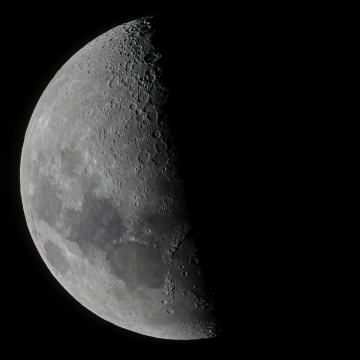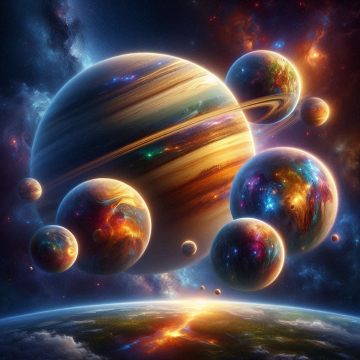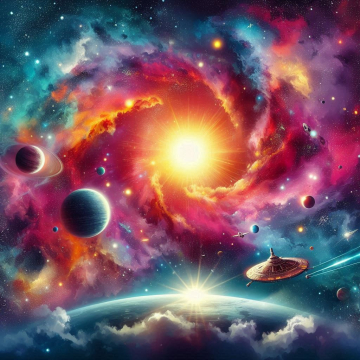The relationship between the Moon and human fertility has been the subject of speculation, myths and beliefs throughout history. From ancient legends to contemporary theories, the idea that the Moon exerts some kind of influence on the ability to conceive has captured the imagination of cultures around the world. In this article, we will explore the various perspectives on how the Moon could affect human fertility, examining both popular beliefs and scientific evidence behind this intriguing phenomenon.
Myths and legends: The moon as a goddess of fertility.
The connection between the Moon and fertility dates back to ancient mythologies that personified the Moon as a female deity linked to life and fertility. In various cultures, the Moon was associated with goddesses such as Selene, Luna, and Artemis in Greek mythology, and with deities such as Ishtar in Mesopotamian mythology. These mythological depictions often suggest that the Moon played a crucial role in the cycles of life, including fertility.
Menstrual cycles and moon phases: Is there a real connection?
One of the oldest and most persistent theories is the idea that women's menstrual cycles are synchronized with the phases of the Moon. While this may seem fascinating from a symbolic point of view, the scientific evidence to support this notion is limited. Studies have shown mixed results, and most research does not support the idea that women ovulate or menstruate in sync with the lunar phases.
However, some research suggests that moonlight could affect sleep patterns and therefore indirectly influence menstrual cycles. Exposure to light at night, including moonlight, can affect the production of melatonin, a hormone related to sleep and the regulation of reproductive cycles.
Full moon and births: Reality or coincidence?
Another popular belief is that the Moon, especially in its full Moon phase, is associated with an increase in childbirth. This concept, known as the "full moon effect", has been the subject of numerous studies and statistical analyses. Although some reports suggest a slight increase in the number of births during full moon phases, the overall evidence does not conclusively support this correlation.
Experts note that any increase in births during the full Moon could be due to external factors, such as changes in atmospheric pressure, weather conditions or even psychological influences, rather than an intrinsic connection to the Moon.
Fertility and the moon in traditional and alternative medicine.
In various medical and alternative traditions, methods have been proposed to harness the Moon's influence on fertility. Traditional Chinese medicine, for example, considers certain lunar phases to be more conducive to conceiving. Specific practices have also been developed, such as "lunar conception," which suggests having sex at specific times in the lunar cycle to increase the chances of conception.
In alternative medicine, some people turn to lunar astrology and Moon-based methods, such as the "lunar conception chart," which uses the position of the Moon at the time of conception to predict the baby's sex and other aspects. related to the health of the future child.
Lunar cycles and fertility: Scientific perspectives.
Despite the rich history of myths and beliefs, the scientific community tends to be skeptical of the Moon's direct influence on human fertility. Conception and reproduction are influenced by a multitude of factors, from hormonal health to genetics, and moon phases have not been shown to be a significant determinant.
Studies that have explored the relationship between the Moon and fertility often conclude that variations in conception are not consistently correlated with lunar phases. Modern science points more toward biological and environmental factors, such as the couple's reproductive health and living conditions, as key determinants of fertility.
The psychology of belief: When the mind influences the body.
The psychology of belief plays a crucial role in the perception of the lunar influence on fertility. The human mind has a powerful ability to create associations and patterns, even when there is no solid scientific basis. In some cases, individual expectations and beliefs can influence the perception of Moon-related fertility, creating a kind of self-fulfilling prophecy.
Contemporary practices: Technological applications and fertility applications.
Although science largely disproves the Moon's direct influence on fertility, some contemporary couples have adopted modern approaches to increase their chances of conception. Fertility apps and menstrual cycle monitoring devices use algorithms and collected data to predict fertile periods, without relying on moon phases.
These methods focus on observing bodily symptoms, such as changes in basal temperature and cervical consistency, rather than relying on myths or cultural beliefs. They are tools that take advantage of technology to provide precise and personalized information about the most favorable times to conceive.
Between tradition and science.
The connection between the Moon and human fertility has persisted throughout history, rooted in myths, legends, and cultural beliefs. Although modern science does not conclusively support the Moon's direct influence on fertility, it is fascinating to explore how these beliefs have not disappeared despite scientific advances.
Ultimately, the perception of the connection between the Moon and human fertility is subjective and varies based on individual and cultural beliefs. While some continue to search for signs on the Moon, others rely on more scientific and technological methods to optimize their chances of conception. Whether we embrace ancient traditions or trust modern science, the relationship between the Moon and fertility remains an intriguing mystery that reflects the complexity of the interaction between nature, culture and human perception.






